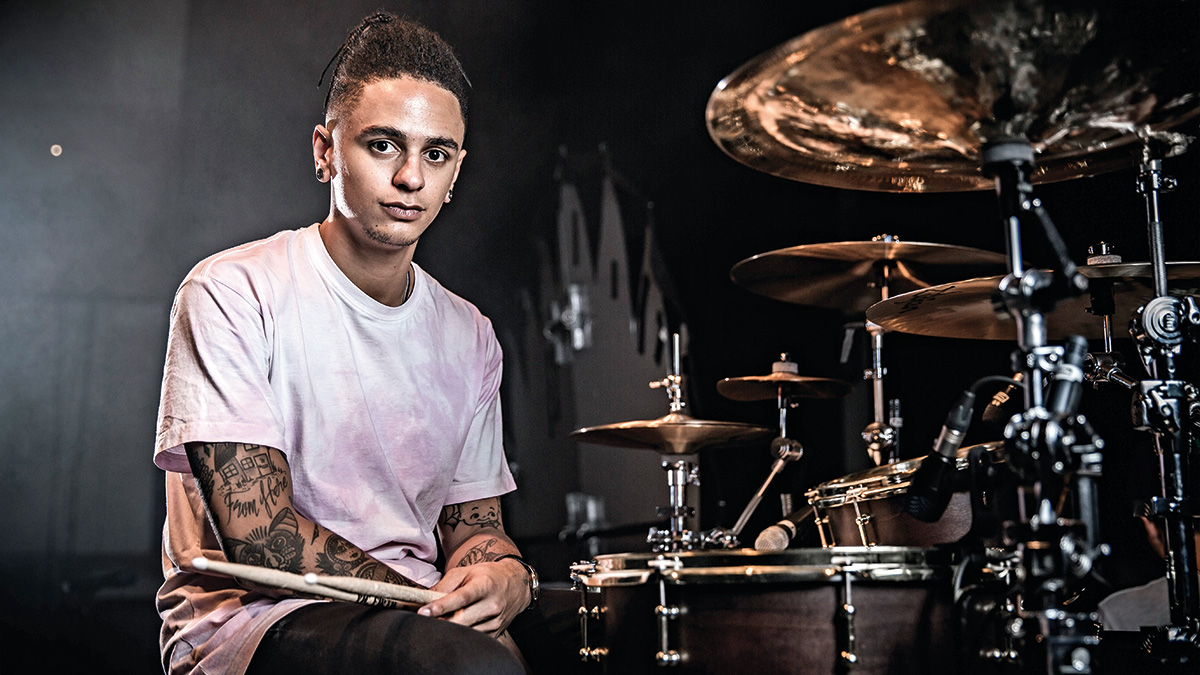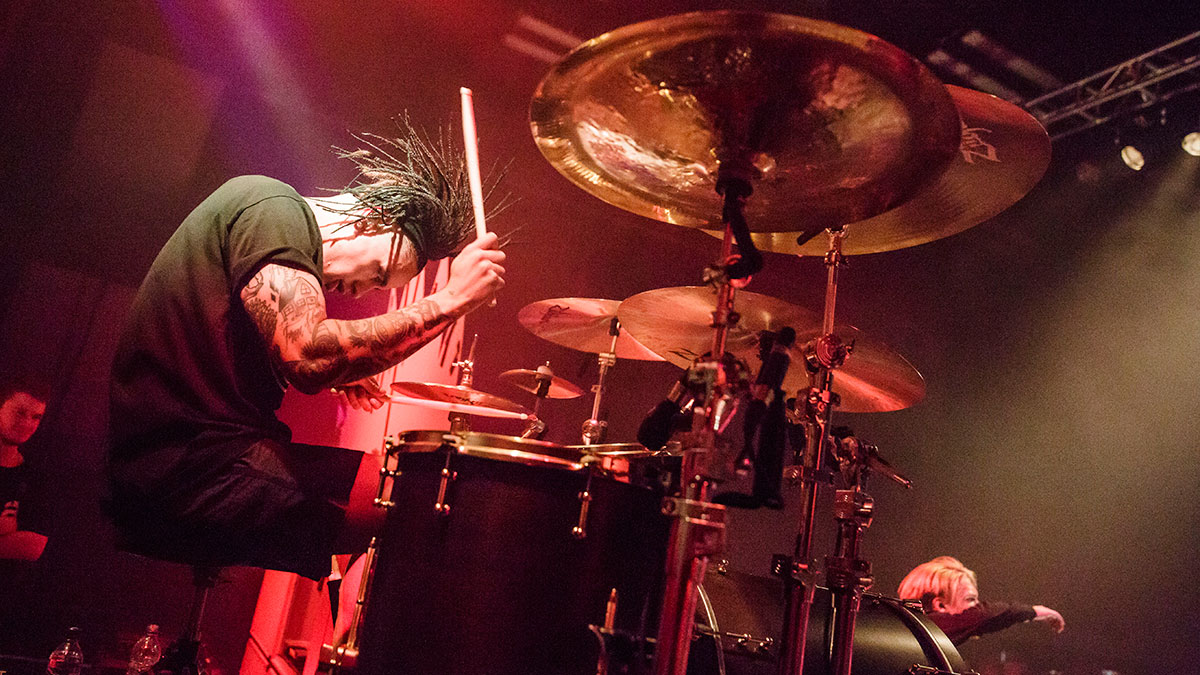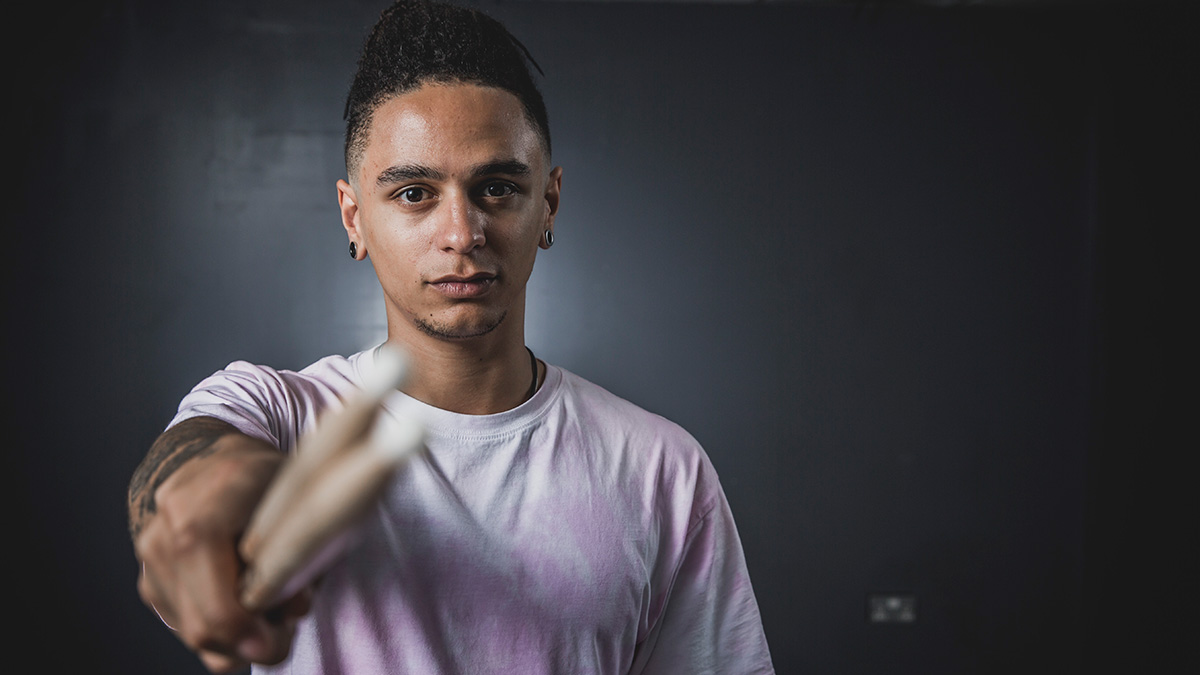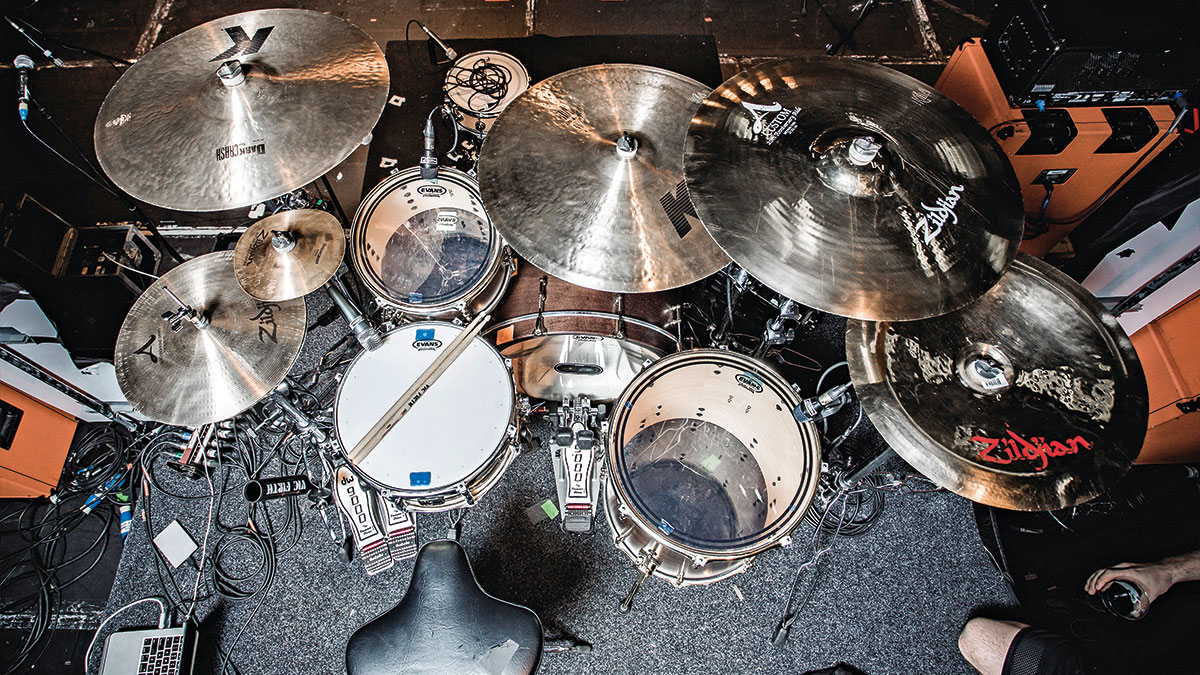Neck Deep's Dani Washington: "I like to be as aggressive and heavy as possible."
Pop punk's fastest-rising sticksman speaks!

"I like to be as aggressive and heavy as possible."
The year 2015 was huge for Neck Deep. The quintet, from Wrexham, brought their rambunctious brand of pop-punk into the UK top ten with their second album Life’s Not Out To Get You.
Dani Washington comes from a rhythmic family – his father Steve is a professional session drummer who has played for Take That and Whitney Houston, but Dani’s tastes are a little heavier.
“I get all my inspiration from people like Tomas Haake from Meshuggah, just really techy, complex stuff. I listen to a lot of Animals As Leaders, Tool, anything that’s complex is where I get my style from.
There were always drums around the house when Washington was growing up and in his teens he realised music was his calling.
“It was partially because I can’t really do anything else so I was like, okay I’ll play drums, and I just grew to love it.”
From the outside, the band’s rise seems incredibly rapid. Has it been a whirlwind from your perspective?
“Oh yeah. It can look like we’ve just been handed everything on a plate in a way, but since December 2012 we’ve pretty much not stopped.
“We’ve toured everywhere, we’ve hardly been home. we’re playing London tonight, but since January we’ve been to Australia, Japan, Malaysia, all over South-East Asia, and tomorrow we fly to America and have two months there.
"Then we come back and we’re doing Europe. it’s constant, it never stops. I feel like, although it has happened very quickly, we have put the work in. I think we deserve to have the recognition that we have because we’ve worked really hard for it.”
How do you take your interest in Animals As Leaders and Meshuggah, and apply that to Neck Deep?
“I love playing with ghost notes, you can hear a lot of them in our music. I also use a double pedal, so I like to follow the rhythm of the guitar leads with my feet in certain areas. I like adding syncopated fills and I get that from those artists and just the heavier take on pop-punk. I like to be as aggressive and heavy as possible but clever about it rather than just single strokes hitting fast all the time, that doesn’t interest me.”

"The way I was writing my parts was very much off feel."
When you’re working with producers from a pop-punk background, do they wonder why you have a double-kick pedal?
“The last record [Life’s Not out to Get You] we did with a producer called Andrew Wade, from Florida. We worked with him, the vocalist from A Day To Remember, Jeremy McKinnon, and Tom Denney who has helped with producing their stuff for years, so we had a bit of a dream team.
“I remember going into the studio for day one of drums and Andrew Wade was like, ‘Why have you got this pedal? You don’t need it.’ I was like, ‘No, I do, this is how I play.’ I know he’s worked with metal artists so I explained to him and, from that moment, the whole time we were recording, he fully understood it and we just bounced off each other.
“The way I was writing my parts was very much off feel. We’d play the track and I’d just jam and jam, and we’d pick out cool parts that just happened naturally and he was a big help in that and he really understood my sound. For the next record I would 100 percent go back and work with him.
“It is different being in a pop-punk band, having a double pedal and taking that approach. I’ve not come across another drummer in a pop-punk band that we’ve toured with that has had the same kit as me, or used double pedals, or effects cymbals, but I guess that’s what makes me unique in a way.”
Where did you record Life’s Not Out To Get You?
“We recorded it in Jeremy McKinnon’s house. My drum kit was set up in his front room. Behind me was the TV and in front of me was the sofa.
“Honestly, it was amazing. Just having Andrew Wade and his knowledge made it amazing. I think it could have gone tits-up very easily if we didn’t have the right producer but he really made it special, especially with the mics.
“Obviously the kit was miked but he used a lot of ambient mics all around the house. It was a bungalow, so there were mics in the kitchen, mics outside, and he used them in the recordings. it just made it sound really special and different and it’s cool to say that that album, and the drums especially, that did so well was recorded in someone’s front room and the mics were scattered around the house.”
What did you track to?
“We went to Andrew’s house first and recorded rough demos of everything, so we re-tracked all the original demos that we had to clicks just to have them of a standard that I could record to.
“I had the guitars and a click and we punched in some midi drums as well, then when I went to record we took those out and I played over the top of that. I did all my drums in two and a half days.
“I was worrying because anytime I’ve ever recorded before, I found out when we got to the studio that I was doing them last. Then we were getting pushed for time, we had five days left before I had to go home and I was so worried.
“Then we had a problem with the desk and on the first day of recording I didn’t start until nine, 10 o’clock at night. I did one song and then went back to the house and came early in the morning. But it wasn’t rushed, we spent a lot of time on each song. It just naturally happened that fast. I planned for it to be longer but we just didn’t need any more time, it was perfect.”

"I'm always criticising myself..."
Do you ever wish you could record the songs after having the chance to play them live?
“Oh yeah. Everything I ever record, after a month or so I wish I could change parts, but to me that’s just natural progression. If I recorded something and I was still happy with it within a year, I wouldn’t feel like I had gotten better as a drummer.
“I’m always criticising myself, every time I play, everything I do, I always imagine how I could have done it better, always, especially with drums. so yeah, when I listen back to recordings of the album or anything we’ve recorded in the past, there are always parts I pick out and even if it’s just the smallest thing, I go, ‘Oh that hit could have been nicer,’ or ‘I should have played it on this cymbal,’ or ‘i should have come out of that fill differently’. It’s just part of the development of me as a musician.”
How are you adjusting to life in the spotlight?
“People are very respectful of our personal space and our personal time. Our relationship with fans is very open in the way that we do a lot of free meet and greets. We’re not the kind of band that will just hide away in a dressing room and not make the effort to go and speak to people that support us. It’s not as intense as I’ve seen it with a lot of other bands because kids know that if they want to speak to us, they can walk into the venue and we’ll be stood there watching the support bands, so it’s very relaxed in that sense. It has not really been too crazy yet. I don’t know what it’s going to be like in a couple of years but right now it’s just like having lots of friends all over the world.”
Were there any adjustments you had to make for playing to bigger crowds?
“For me, the more people, the more comfortable I feel. I feel way more relaxed playing on a stage in front of 12,000 people than playing in a room full of 100 people. I don’t know why. I like the response from the bigger crowd. It’s probably because it’s just a blur, it’s like playing in front of a picture, it doesn’t feel real, whereas if it’s 100 kids you can pretty much see everyone because they’re right in front of you. I prefer playing in front of bigger crowds.”

Dani's Kit
SJC Custom maple kit in Black Satin Stain finish
12"x8" tom
16"x14" floor tom
22"x18" kick drum
14"x6.5" 10-ply maple snare
Zildjian Cymbals
14" Mastersound hi-hats
20" K Dark Thin crash
8" Trashformer
22" K ride
21" A Custom Medium Thin ride
Oriental China
Plus
DW 9000 double pedal and hardware; Vic Firth 5B nylon tip sticks; Evans heads